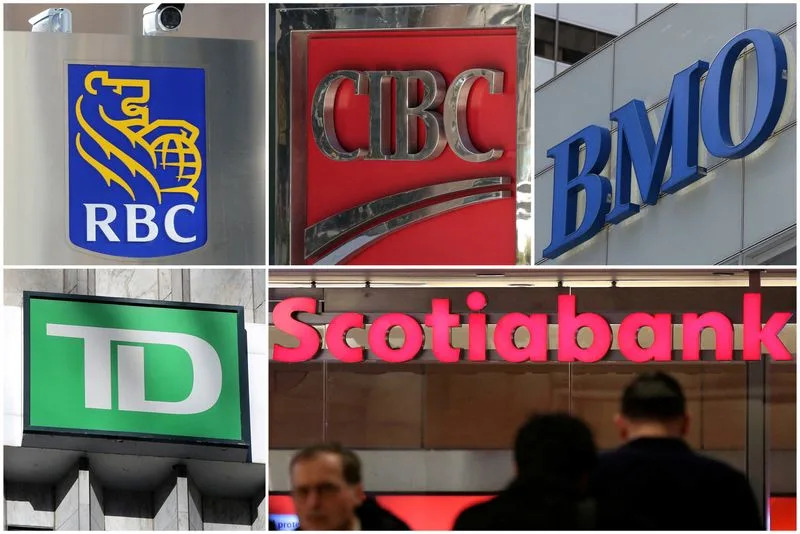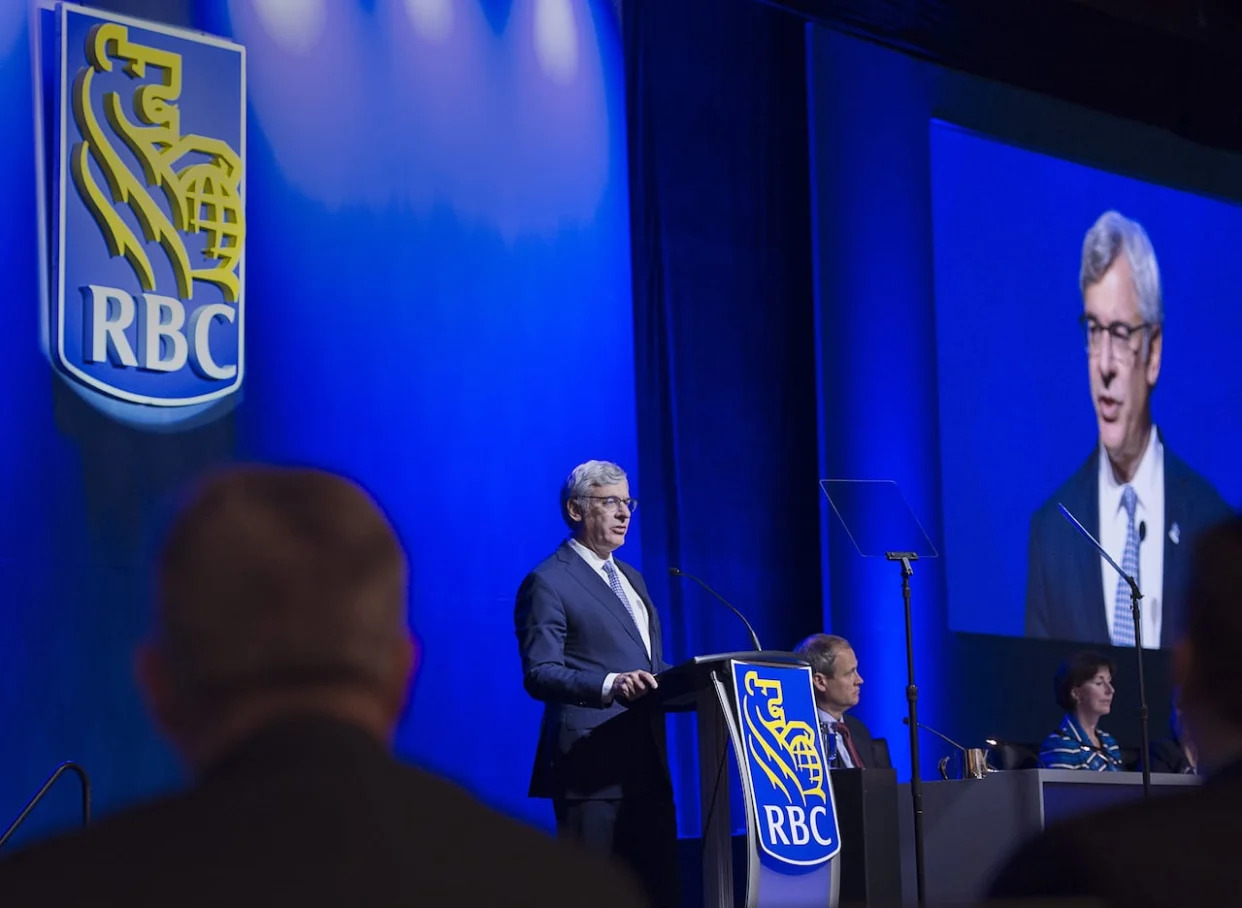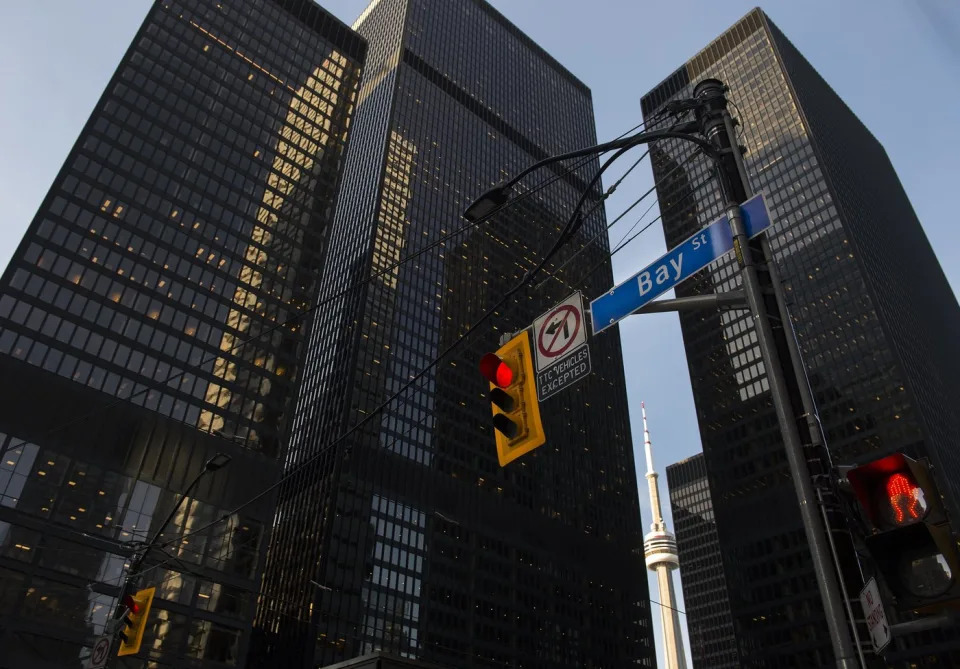Reuters
Thu, June 13, 2024

FILE PHOTO: A combination photo shows Canadian investment banks RBC CIBC BMO TD and Scotiabank in Toronto
TORONTO (Reuters) - The CEOs of Canada's big five banks on Thursday reassured members of parliament about their commitment to fighting climate change, but said reducing funding for fossil fuel extraction would take time and more works need to be done to reach net zero emissions.
In a rare meeting, MPs grilled the heads of Royal Bank of Canada, TD Bank Bank of Montreal, Bank of Nova Scotia and CIBC appeared via videolink before a House of Commons committee to answer questions about any steps their banks are taking to help reduce greenhouse gas emissions and steer away from fossil fuel funding.
Canadian banks, among the biggest oil and gas financiers in the world, have come under pressure over recent years with demands to change their lending practices that contribute to climate change.
The five banks financed about $104 billion to fossil fuels last year, 13% of the value of the deals covered from global banks, according to a recent report.
The banking and oil and gas industries contribute roughly about 3% to 5% to Canada's gross domestic product.
"Energy is still a big part of the Canadian economy. And therefore, we have to continue to support the economy as we make the transition, you have to do both, can't just do one," RBC CEO Dave McKay said in response to a member of parliament's questions.
The banks have all set climate goals but members questioned the lack of commitment to only finance companies if the projects are verified to have an impact that will reduce the greenhouse gas emissions significantly.
"I think that's part of the problem- is that the commitments are vague. We're talking about sustainable investments. There's no real definition around it. There's not a lot of transparency around it," MP Leah Taylor Roy said.
The banks' short and long-term emissions reduction targets includes net-zero in operations and financed emissions by 2050, while helping clients to make the transition.
Canada, the world's fourth-largest oil producer, has pledged to cut greenhouse gas emissions 40% to 45% below 2005 levels by 2030.
TD's CEO Bharat Masrani said it would follow an "orderly transition" and support responsible oil and gas industry responsible while making sure the bank provides capital and investment to move to a net-zero world.
Meanwhile, environment activists criticised the lack of a commensurate plan of action.
"The investments they make are holding the country back from climate progress and, until now, there had been no signs they would be held to account," said Julie Segal, senior manager of climate finance at Environmental Defence Canada said.
(Reporting by Nivedita Balu in Toronto; Editing by David Gregorio)
Bank CEOs face questions from MPs over climate policy
CBC
Thu, June 13, 2024

David McKay, president and CEO of RBC, addresses the company's annual meeting in Halifax in April 2019. Representatives from Canada's five biggest banks faced questions from MPs this afternoon over their commitments to help reduce greenhouse gas emissions and spur the transition to renewable forms of energy.
CBC
Thu, June 13, 2024

David McKay, president and CEO of RBC, addresses the company's annual meeting in Halifax in April 2019. Representatives from Canada's five biggest banks faced questions from MPs this afternoon over their commitments to help reduce greenhouse gas emissions and spur the transition to renewable forms of energy.
(Andrew Vaughan/The Canadian Press - image credit)
Representatives from Canada's five biggest banks were put on the defensive as they faced questions from MPs over their commitments to help the country meet its climate goals and spur the transition to renewable forms of energy.
The chief executives of Royal Bank, CIBC, TD Bank Group, BMO Financial Group and Scotiabank appeared Thursday before the standing committee on environment and sustainable development. All five opted to attend by videoconference.
NDP MP Matthew Green criticized David McKay, the head of RBC, for "touting" his climate record, while "continuing to be one of the largest financiers of fossil fuels in the world."
"This is a transition," McKay said.
"It's a complex transition. We are not getting off fossil-based fuels immediately. To just stop is not an option for us. We have to commit to finding green sources of energy."
Canadian banks have come under criticism for how their lending practices contribute to climate change, given that they are among the largest financiers of oil, gas and coal globally. A recent report calculated that Canada's top banks pumped a combined $103.85 billion US into fossil fuel projects in 2023.
The five largest banks have made both short- and long-term emissions reduction targets, including net-zero financed emissions by 2050, but have also been criticized for not moving fast enough.
Anotherrecent report, from InfluenceMap, a global climate policy watchdog, found that Canada's largest five banks have not aligned "their short- and medium-term emissions reduction targets with their long-term net zero commitments."
"All five banks have set 2030 interim targets for the oil, gas, and power sectors among other sector targets. However, these are almost all relative, intensity-based targets, allowing for absolute financed emissions to rise."
Today's testimony comes a week after the same committee questioned the CEOs of Canada'stop oil and gas producers over their climate commitments.
New rules for banks?
Independent Quebec Sen. Rosa Galvez has proposed a bill, known as the Climate-Aligned Finance Act, that would impose new rules on Canadian financial institutions to make sure they are aligned with the country's climate goal.
The bill was tabled more than two years ago, but it remains at the committee stage in the Senate. It faces several more hurdles before it would be put to a vote in the Senate, and then make its way to the House of Commons.
The Canadian Bankers Association (CBA), which represents the country's largest banks, isopposed to the legislation, saying it would add unnecessary regulations on the sector.
Maggie Cheung, a CBA spokesperson,told CBC News recently that "Canada's banks understand the important role that the financial sector can play in facilitating an orderly transition to a low-carbon future."
"This includes working with clients across industries to help them decarbonize and pursue energy transition opportunities, and financing new and existing green projects that will help Canada meet its net-zero ambitions," Cheung said.
Julie Segal, a climate finance specialist with the advocacy group Environmental Defence, said Thursday the banks' "voluntary climate commitments have proven fickle" and more regulations are "direly needed."
"We need credible climate transition transition plans from these banks and financial institutions, and since thy are not designing these on their own we need rules to ensure they happen and are delivered," she said.
Representatives from Canada's five biggest banks were put on the defensive as they faced questions from MPs over their commitments to help the country meet its climate goals and spur the transition to renewable forms of energy.
The chief executives of Royal Bank, CIBC, TD Bank Group, BMO Financial Group and Scotiabank appeared Thursday before the standing committee on environment and sustainable development. All five opted to attend by videoconference.
NDP MP Matthew Green criticized David McKay, the head of RBC, for "touting" his climate record, while "continuing to be one of the largest financiers of fossil fuels in the world."
"This is a transition," McKay said.
"It's a complex transition. We are not getting off fossil-based fuels immediately. To just stop is not an option for us. We have to commit to finding green sources of energy."
Canadian banks have come under criticism for how their lending practices contribute to climate change, given that they are among the largest financiers of oil, gas and coal globally. A recent report calculated that Canada's top banks pumped a combined $103.85 billion US into fossil fuel projects in 2023.
The five largest banks have made both short- and long-term emissions reduction targets, including net-zero financed emissions by 2050, but have also been criticized for not moving fast enough.
Anotherrecent report, from InfluenceMap, a global climate policy watchdog, found that Canada's largest five banks have not aligned "their short- and medium-term emissions reduction targets with their long-term net zero commitments."
"All five banks have set 2030 interim targets for the oil, gas, and power sectors among other sector targets. However, these are almost all relative, intensity-based targets, allowing for absolute financed emissions to rise."
Today's testimony comes a week after the same committee questioned the CEOs of Canada'stop oil and gas producers over their climate commitments.
New rules for banks?
Independent Quebec Sen. Rosa Galvez has proposed a bill, known as the Climate-Aligned Finance Act, that would impose new rules on Canadian financial institutions to make sure they are aligned with the country's climate goal.
The bill was tabled more than two years ago, but it remains at the committee stage in the Senate. It faces several more hurdles before it would be put to a vote in the Senate, and then make its way to the House of Commons.
The Canadian Bankers Association (CBA), which represents the country's largest banks, isopposed to the legislation, saying it would add unnecessary regulations on the sector.
Maggie Cheung, a CBA spokesperson,told CBC News recently that "Canada's banks understand the important role that the financial sector can play in facilitating an orderly transition to a low-carbon future."
"This includes working with clients across industries to help them decarbonize and pursue energy transition opportunities, and financing new and existing green projects that will help Canada meet its net-zero ambitions," Cheung said.
Julie Segal, a climate finance specialist with the advocacy group Environmental Defence, said Thursday the banks' "voluntary climate commitments have proven fickle" and more regulations are "direly needed."
"We need credible climate transition transition plans from these banks and financial institutions, and since thy are not designing these on their own we need rules to ensure they happen and are delivered," she said.
Bank CEOs push back on MP calls to reduce oil and gas funding
Ian Bickis
Thu, June 13, 2024

The Canadian Press
The CEOs of Canada's five biggest banks stuck to the message that they're committed to help in the energy transition as they were questioned by a parliamentary committee Thursday about their impacts on climate change.
The leaders of Royal Bank of Canada, TD Bank Group, BMO Financial Group, Scotiabank and CIBC pushed back against MPs who said they were making the problem worse by funding the oil and gas industry to the tune of more than a hundred billion a year, and challenged them to cut back.
"Just stop is just not an option for us," said RBC chief executive Dave McKay, appearing by video conference along with the other CEOs before the House of Commons standing committee on environment and sustainable development.
"It's important that we do this in an orderly fashion, or we risk the entire journey. We have to protect jobs along the way," he said.
The banks all talked about their commitments to working with clients through the transition, rather than pull back on funding, along with their net zero and sustainable finance targets.
Pushed to at least stop funding fossil fuel expansion, executives maintained that it's not that straightforward.
"This is a complex transition. We are not getting off fossil-based fuels immediately," said McKay, who, as head of Canada's largest bank and largest oil and gas funder, was asked the most questions.
Executives said they have to keep funding fossil fuels, as well as cleaner energy sources.
"We have to do both," said TD Bank Group chief executive Bharat Masrani.
"We have to support oil and gas industry, responsible oil and gas industry, as we go through this orderly transition. And at the same time, make sure we are providing the capital in the to move to a net zero world."
In a press conference ahead of the testimony, several environmental groups thanked the committee for its leadership in summoning bank executives, and called on legislators to put in regulations to force banks to take more action on climate change.
While the banks have made various commitments, they aren't moving fast enough, and haven't said how they plan to achieve those targets, said Julie Segal, senior manager of climate finance at Environmental Defence.
“While each of the Canadian banks have climate commitments, none of them have a commensurate plan of action," said Segal.
"Their voluntary climate commitments have proven fickle, with them continuing to overinvest in oil and gas and underinvest in clean climate solutions."
The appearance of the bank executives comes a week after testimony at the same committee by the CEOs of Canada's biggest oil and gas producers, which face a proposed legislated cap on emissions.
Parliamentary efforts to rein in the banking sector's indirect impact on climate are largely limited to Independent Sen. Rosa Galvez's proposed Climate-Aligned Finance Act, which remains in the Senate banking committee.
While there's disagreement on the rules and choices needed to make the energy transition happen, there was some agreement at least on the need to move faster.
"There is anxiety in the country about making this transition, and therefore Canada has to move and keep moving forward," said McKay.
"We have to accelerate that transition."
This report by The Canadian Press was first published June 13, 2024.
Companies in this story: (TSX:RY; TSX:BMO; TSX:TD; TSX:BNS; TSX:CM)
Ian Bickis, The Canadian Press
Ian Bickis
Thu, June 13, 2024

The Canadian Press
The CEOs of Canada's five biggest banks stuck to the message that they're committed to help in the energy transition as they were questioned by a parliamentary committee Thursday about their impacts on climate change.
The leaders of Royal Bank of Canada, TD Bank Group, BMO Financial Group, Scotiabank and CIBC pushed back against MPs who said they were making the problem worse by funding the oil and gas industry to the tune of more than a hundred billion a year, and challenged them to cut back.
"Just stop is just not an option for us," said RBC chief executive Dave McKay, appearing by video conference along with the other CEOs before the House of Commons standing committee on environment and sustainable development.
"It's important that we do this in an orderly fashion, or we risk the entire journey. We have to protect jobs along the way," he said.
The banks all talked about their commitments to working with clients through the transition, rather than pull back on funding, along with their net zero and sustainable finance targets.
Pushed to at least stop funding fossil fuel expansion, executives maintained that it's not that straightforward.
"This is a complex transition. We are not getting off fossil-based fuels immediately," said McKay, who, as head of Canada's largest bank and largest oil and gas funder, was asked the most questions.
Executives said they have to keep funding fossil fuels, as well as cleaner energy sources.
"We have to do both," said TD Bank Group chief executive Bharat Masrani.
"We have to support oil and gas industry, responsible oil and gas industry, as we go through this orderly transition. And at the same time, make sure we are providing the capital in the to move to a net zero world."
In a press conference ahead of the testimony, several environmental groups thanked the committee for its leadership in summoning bank executives, and called on legislators to put in regulations to force banks to take more action on climate change.
While the banks have made various commitments, they aren't moving fast enough, and haven't said how they plan to achieve those targets, said Julie Segal, senior manager of climate finance at Environmental Defence.
“While each of the Canadian banks have climate commitments, none of them have a commensurate plan of action," said Segal.
"Their voluntary climate commitments have proven fickle, with them continuing to overinvest in oil and gas and underinvest in clean climate solutions."
The appearance of the bank executives comes a week after testimony at the same committee by the CEOs of Canada's biggest oil and gas producers, which face a proposed legislated cap on emissions.
Parliamentary efforts to rein in the banking sector's indirect impact on climate are largely limited to Independent Sen. Rosa Galvez's proposed Climate-Aligned Finance Act, which remains in the Senate banking committee.
While there's disagreement on the rules and choices needed to make the energy transition happen, there was some agreement at least on the need to move faster.
"There is anxiety in the country about making this transition, and therefore Canada has to move and keep moving forward," said McKay.
"We have to accelerate that transition."
This report by The Canadian Press was first published June 13, 2024.
Companies in this story: (TSX:RY; TSX:BMO; TSX:TD; TSX:BNS; TSX:CM)
Ian Bickis, The Canadian Press
No comments:
Post a Comment